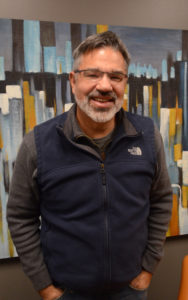
By Steve Brawner, © 2019 by Steve Brawner Communications, Inc.
The pastor who started a church for white, black and brown people to worship together says churches must get serious about another color – green.
Mark DeYmaz started Mosaic Church in Little Rock in 2001 after deciding God was calling him to start a multiethnic congregation in a city with a segregationist history.
Now it’s a thriving inner city church. Its ministry arm, Vine and Village, monthly provides three or four days’ worth of groceries to residents of one of the city’s neediest areas. Operating partly through grants and partnerships, last year it fed 20,000 unique individuals in a zip code with 32,000 people.
Along the way, DeYmaz realized the typical church’s financial approach – more members equals more money for operations and ministries – wouldn’t work at Mosaic. Too many of his people are too poor.
“In theory, the more people that come, the more butts in the seat, the more bucks in the offering plate,” he said. “That’s kind of been the model, right? But when you’re working in the inner city, urban space, you know, you’ve got homeless people … They need your resources more than they have resources to put in.”
The church previously occupied a long-empty Walmart in a long-empty shopping center. Because of Mosaic’s presence, the center began filling up with new businesses. The church had created new life, like the Gospel it preaches.
DeYmaz began considering how churches can leverage their assets to meet ministry needs. When it moved to a nearby empty Kmart, it rented out half its space to a fitness center. That check pays a big chunk of the mortgage. It rents its parking lot to a carnival twice a year. It rents space for events. A security firm rents office space. A massage therapist is opening a practice in an unused nook.
Meanwhile, DeYmaz realized the church was spending $3,000 annually on coffee and thought, “Instead of giving away the free coffee, what if we monetize that?” It invested $25,000 to start its own coffee shop – the first in that part of town – that’s open Thursday and Sunday mornings. The church no longer provides free coffee unless congregants can’t afford it.
These money-making steps enable Mosaic to operate its ministries while remaining financially viable.
But DeYmaz says other churches must also adopt this model to deal with changing times, which is why he’s written a book, “The Coming Revolution in Church Economics.” He said younger generations don’t give as much as previous ones, so churches lose money when an older member dies or leaves and is replaced by someone younger. Many people are struggling to make ends meet and don’t have extra money to give. Eventually churches could lose their tax-exempt status, as former presidential candidate Beto O’Rourke recently suggested.
“Most pastors right now, in terms of money, they’re only managing decline, and they don’t even know it,” DeYmaz said.
DeYmaz says churches have not only a need to leverage their assets, but also a biblical duty. Churches should find ways to earn revenues fairly and then invest that money in meeting needs because 21st century Americans must see love demonstrated before they’ll be open to the church’s Gospel message. He points to the Parable of the Talents in Matthew 25, where the wise servants invest their resources while the foolish one buries his. When I asked about Jesus throwing the moneychangers out of the temple, DeYmaz said they were ripping off the poor and preventing them from worshipping, while the religious leaders profited. That’s not what Mosaic is doing.
There will be challenges. Churches must pay taxes on their profit-making enterprises – or spin them off so they can donate back to the church. They’ll have to navigate employment and non-discrimination laws.
DeYmaz said churches will make mistakes, but they’ll learn through trial and error, and someday this will be normal. At Mosaic, a “fashion show” event by one renter turned out to be a risque affair conducted as the church’s Hispanic worship team was rehearsing. After that happened, the church adjusted its policies.
DeYmaz is not afraid of the process. Why should he be? He started a church in Little Rock for white, black and brown people to worship together. He’s confident Mosaic can make a little green and stay out of the red without compromising its values.
As he explained, “Fear, fear of failure, fear of risk or making a mistake and having to adjust, none of that stuff in my opinion should keep pastors from leaning into this.”